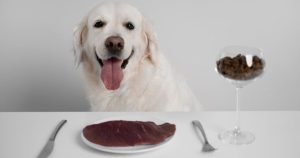Can Dogs Eat Pork Bones? A Comprehensive Guide for Pet Owners
Introduction
can dogs eat pork bones? As pet owners, we often find ourselves questioning what foods are safe for our furry friends. One common query is whether dogs can eat pork bones. While dogs have enjoyed bones as part of their diet for centuries, not all bones are created equal, and pork bones, in particular, can be a source of confusion and concern. This comprehensive guide will address the safety, benefits, and risks associated with feeding pork bones to dogs, and also touch on related topics like raw pork, bacon, ham, and cooked pork. Understanding these aspects can help you make informed decisions about your dog’s diet.
Can Dogs Eat Raw Pork?
Feeding raw pork to dogs is a topic of debate among pet owners and veterinarians. Raw pork can be a source of parasites and bacteria, which pose significant health risks to dogs. Trichinosis, caused by the parasite Trichinella spiralis, is one of the main concerns. This infection can lead to symptoms such as vomiting, diarrhea, lethargy, and muscle pain. While raw feeding enthusiasts argue that raw meat diets can be beneficial for dogs, it is essential to consider these risks and consult with a veterinarian before introducing raw pork into your dog’s diet.
Can Dogs Eat Pork Bones?
The question “Can dogs eat pork bones?” is more complex than it may seem. Pork bones can be dangerous for dogs, especially when they are cooked. Cooked pork bones tend to splinter easily, creating sharp fragments that can cause internal injuries, choking, or blockages in the digestive tract. Raw pork bones, on the other hand, are less likely to splinter and can be a safer option. However, even raw bones come with risks, such as dental fractures and gastrointestinal injuries. If you decide to give your dog raw pork bones, supervision is crucial to prevent accidents.

Pros of Feeding Pork Bones:
- Dental Health: Chewing on raw bones can help clean a dog’s teeth and reduce plaque buildup.
- Mental Stimulation: Gnawing on bones provides mental stimulation and can keep dogs entertained.
- Nutritional Benefits: Raw bones contain nutrients like calcium and phosphorus, which are beneficial for dogs.
Cons of Feeding Pork Bones:
- Choking Hazard: Small pieces of bone can become lodged in a dog’s throat, causing choking.
- Internal Injuries: Sharp bone fragments can puncture the digestive tract, leading to serious health issues.
- Bacterial Contamination: Raw pork bones can carry harmful bacteria, posing a risk of infection.
Can Dogs Eat Bacon?
Bacon is a delicious treat that many dogs find irresistible, but it’s not the healthiest option for them. High in fat and salt, bacon can lead to obesity, pancreatitis, and other health problems in dogs. While an occasional small piece of bacon may not harm your dog, it is best to avoid feeding bacon regularly. Instead, opt for healthier treats that provide nutritional benefits without the risks associated with high-fat and high-salt foods.
Can Dogs Eat Ham?
Ham, like bacon, is high in fat and salt, making it an unsuitable regular treat for dogs. Additionally, ham often contains preservatives and additives that can be harmful to dogs. Consuming too much ham can lead to digestive issues, dehydration, and even kidney problems due to its high sodium content. If you want to give your dog a meaty treat, consider leaner options that are lower in fat and salt.
Can Dogs Eat Cooked Pork?
Cooked pork can be a safe and nutritious option for dogs when prepared correctly. It is crucial to ensure that the pork is cooked thoroughly to eliminate any harmful bacteria and parasites. Avoid seasoning the pork with spices, garlic, or onions, as these can be toxic to dogs. Additionally, remove any bones before feeding cooked pork to your dog to prevent choking hazards and internal injuries. Lean cuts of pork, such as pork loin, can be a good source of protein for dogs when given in moderation.
Types of Pork Suitable for Dogs:
- Pork Loin: A lean cut that is high in protein and low in fat.
- Pork Tenderloin: Another lean option that is easy to digest and nutritious.
- Ground Pork: When cooked thoroughly and unseasoned, ground pork can be a versatile addition to your dog’s diet.
Pros of Feeding Cooked Pork:
- High Protein: Pork is a good source of protein, essential for muscle growth and repair.
- Rich in Vitamins and Minerals: Pork contains vitamins B6 and B12, iron, zinc, and selenium, all beneficial for dogs.
- Tasty and Palatable: Many dogs find pork highly palatable, making it an excellent option for picky eaters.
Cons of Feeding Cooked Pork:
- High Fat Content: Some cuts of pork can be high in fat, leading to obesity and pancreatitis if fed in excess.
- Seasonings and Additives: Pork prepared for human consumption often contains harmful seasonings and additives.
- Risk of Overfeeding: Pork can be calorie-dense, so it’s essential to feed it in moderation to avoid weight gain.
Conclusion
In conclusion, while dogs can eat pork bones, it is essential to understand the associated risks and benefits. Raw pork bones can be safer than cooked ones but still require careful supervision. Cooked pork, when prepared correctly, can be a nutritious addition to your dog’s diet, while bacon and ham should be given sparingly due to their high fat and salt content. Always consult with your veterinarian before making significant changes to your dog’s diet. For more pet care tips and advice, visit blogwave.info.
FAQs
Can pork bones splinter?
Yes, pork bones, especially when cooked, can splinter and cause internal injuries or choking hazards for dogs.
Is raw pork safe for dogs?
Raw pork carries the risk of parasites and bacteria, so it is not generally recommended without consulting a veterinarian.
What are the symptoms of trichinosis in dogs?
Symptoms include vomiting, diarrhea, lethargy, and muscle pain.
How should pork be prepared for dogs?
Pork should be cooked thoroughly without seasonings or additives and bones should be removed before feeding it to dogs.
Can dogs eat pork fat?
Pork fat is high in calories and can lead to obesity and pancreatitis, so it should be avoided.
What are the benefits of pork for dogs?
Pork is high in protein and contains essential vitamins and minerals beneficial for dogs.



